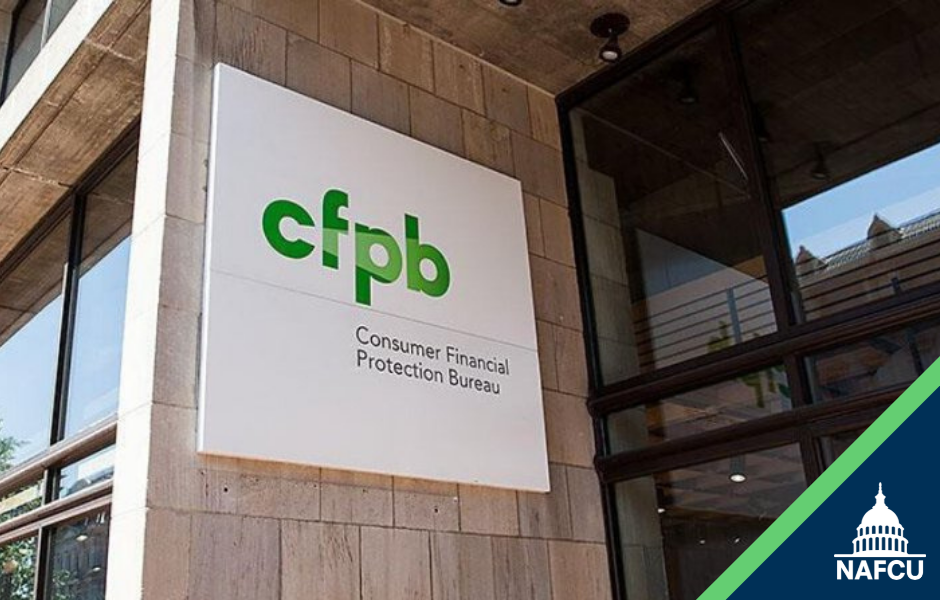Newsroom
NAFCU to CFPB: Ensure fair and transparent financial record access
 NAFCU Senior Counsel for Research and Policy Andrew Morris Wednesday responded to the CFPB’s outline of proposals to implement section 1033 of the Dodd-Frank Act, which aims to provide a formal mechanism for making consumer data portable, sharing several concerns and suggestions on implementing the rule. This set of proposals marks the agency’s next step in issuing a financial data rights rule.
NAFCU Senior Counsel for Research and Policy Andrew Morris Wednesday responded to the CFPB’s outline of proposals to implement section 1033 of the Dodd-Frank Act, which aims to provide a formal mechanism for making consumer data portable, sharing several concerns and suggestions on implementing the rule. This set of proposals marks the agency’s next step in issuing a financial data rights rule.
Currently, the proposals under consideration present significant challenges, both technical and competitive in nature. In the letter, Morris reiterated that the CFPB must avoid implementing section 1033 in a way that will “unfairly burden credit unions with enormous compliance costs and ultimately distort the financial sector’s competitive landscape.”
To mitigate the risks associated with the CFPB’s outline of proposals, NAFCU instead supports an approach that issues “appropriate exemptive relief, scales back the technically prescriptive aspects of the Outline and allows credit unions to exercise appropriate judgment before granting third parties access to member data.”
Morris also underscored that granting access to consumer financial data, including for third-party data recipients, must be governed by principles of transparency, security, and fairness, and which allow consumers to exercise control over the use and retention of their data.
“In general, when exercising section 1033 rights, consumers should know exactly what data a third party will be requesting on their behalf," wrote Morris. “Ultimately, the obligation to ensure that consumer data sharing preferences are honored should fall upon the third party recipient rather than the data provider.”
One of NAFCU’s major concerns relates to the data security of credit unions and their members. Morris noted credit unions have demonstrated great success in complying with the security and privacy requirements under Gramm-Leach Bliley Act (GLBA) and should be viewed as a model by the CFPB when implementing section 1033. He remarked that the bureau should ensure that nonbank, non-supervised third parties comply with similar safeguard guidelines, as adopted by functional banking regulators to mitigate fraud risks.
In addition, the CFPB should ensure that data providers “are able to exercise, at their discretion, appropriate due diligence, and that the duration, scope, and usage of consumer data by third parties is governed by clear disclosures, informed consent, and principles of data minimization,” added Morris.
NAFCU supports empowering consumers with modern financial tools but has emphasized that the bureau should avoid issuing prescriptive technical standards and should instead focus its attention on a principles-based approach that supports a level playing field for all entities subject to a future section 1033 rulemaking.
NAFCU has been an active voice on this topic and has submitted comments to the CFPB on its advance notice of proposed rulemaking on section 1033. The association has also met with agency staff to discuss the rule’s implementation and share related credit union concerns.
Read the letter. NAFCU will continue to work with the bureau on its efforts to balance consumer protections while ensuring a reasonable regulatory environment for credit unions.
Share This
Related Resources
Add to Calendar 2024-06-26 14:00:00 2024-06-26 14:00:00 Gallagher Executive Compensation and Benefits Survey About the Webinar The webinar will share trends in executive pay increases, annual bonuses, and nonqualified benefit plans. Learn how to use the data charts as well as make this data actionable in order to improve your retention strategy. You’ll hear directly from the survey project manager on how to maximize the data points to gain a competitive edge in the market. Key findings on: Total compensation by asset size Nonqualified benefit plans Bonus targets and metrics Prerequisites Demographics Board expenses Watch On-Demand Web NAFCU digital@nafcu.org America/New_York public
Gallagher Executive Compensation and Benefits Survey
preferred partner
Gallagher
Webinar
Add to Calendar 2024-06-21 09:00:00 2024-06-21 09:00:00 2024 Mid-Year Fraud Review Listen On: Key Takeaways: [01:16] Check fraud continues to be rampant across the country. Card fraud is affecting everyone. [04:31] Counterfeit US passport cards are just another new toolbox in the bad actors’ toolbox. [07:21] Blocking the fallback is the only way to defeat counterfeit cards. [11:17] The best way is constant education to your members in as many channels as you can. [13:02] We are still seeing overdraft lawsuits. Make sure the programming you have at your credit union matches what you have displayed for the members. Web NAFCU digital@nafcu.org America/New_York public
2024 Mid-Year Fraud Review
Strategy & Growth, Consumer Lending
preferred partner
Allied Solutions
Podcast
Add to Calendar 2024-06-21 09:00:00 2024-06-21 09:00:00 The Evolving Role of the CISO in Credit Unions Listen On: Key Takeaways: [01:30] Being able to properly implement risk management decisions, especially in the cyber age we live in, is incredibly important so CISOs have a lot of challenges here. [02:27] Having a leader who can really communicate cyber risks and understand how ready that institution is to deal with cyber events is incredibly important. [05:36] We need to be talking about risk openly. We need to be documenting and really understanding what remediating risk looks like and how you do that strategically. [16:38] Governance, risk, compliance, and adherence to regulatory controls are all being looked at much more closely. You are also seeing other technology that is coming into the fold directly responsible for helping CISOs navigate those waters. [18:28] The reaction from the governing bodies is directly related to the needs of the position. They’re trying to help make sure that we are positioned in a way that gets us the most possibility of success, maturing our postures and protecting the institutions. Web NAFCU digital@nafcu.org America/New_York public
The Evolving Role of the CISO in Credit Unions
preferred partner
DefenseStorm
Podcast
Get daily updates.
Subscribe to NAFCU today.
